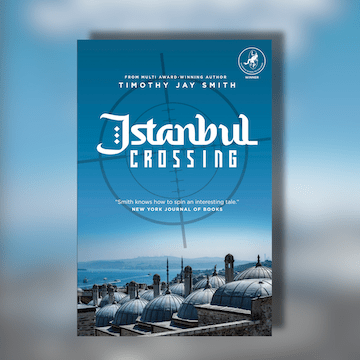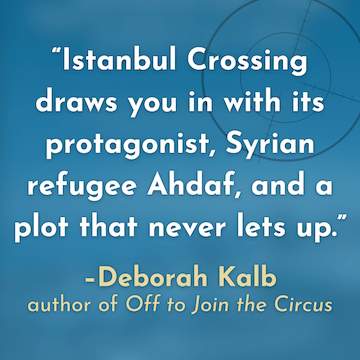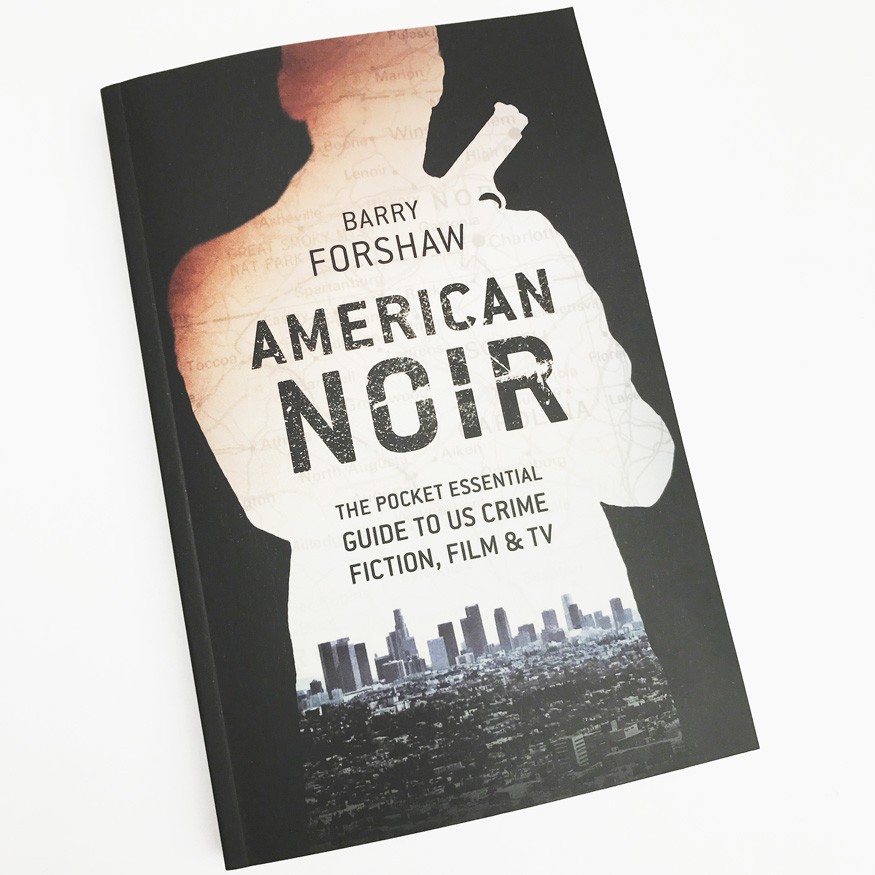
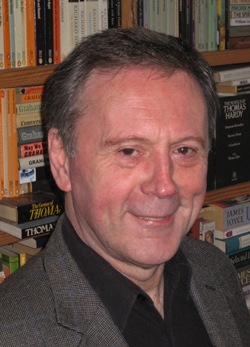 Few people know quite as much about crime fiction as the British author and journalist Barry Forshaw. He’s read more books, interviewed more writers, and written more articles on the topic than just about anyone we know. Futhermore, he’s been working on a series of Pocket Essentials books for Soho Press that explore contemporary crime fiction from top to bottom. In the past he’s appeared here on Crime Fiction Lover talking about Nordic Noir, Euro Noir and Brit Noir. Now, he’s releasing American Noir. We asked Barry to take us on a road trip of the United States, pointing out his favourite writers and their books in a variety of different cities and states.
Few people know quite as much about crime fiction as the British author and journalist Barry Forshaw. He’s read more books, interviewed more writers, and written more articles on the topic than just about anyone we know. Futhermore, he’s been working on a series of Pocket Essentials books for Soho Press that explore contemporary crime fiction from top to bottom. In the past he’s appeared here on Crime Fiction Lover talking about Nordic Noir, Euro Noir and Brit Noir. Now, he’s releasing American Noir. We asked Barry to take us on a road trip of the United States, pointing out his favourite writers and their books in a variety of different cities and states.
Grab yourself a copy of American Noir by clicking here. Now, let’s hand it over to Barry…
Laura Lippman – Baltimore
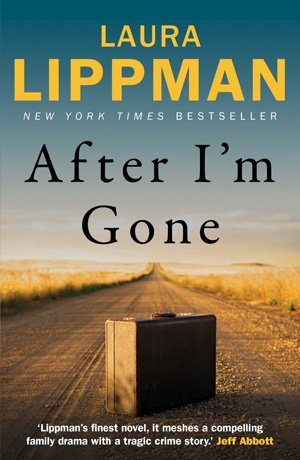 Locale is crucial to the novels of Laura Lippman, and is always vividly evoked: specifically, the writer’s own city of Baltimore. At times she draws us into a modern take on the dark atmosphere of one of her favourite writers who resided in the city, Edgar Allan Poe. The author has admitted to obsessively haunting Poe’s old stamping grounds. But all of this would count for nothing if the plotting were not as rigorous and impressive as it is in her work. Writers such as Gillian Flynn (with Gone Girl) and Paula Hawkins (with The Girl on the Train) may have caught the popular mood for domestic noir and watched their sales rocket, but if there is any justice, Laura Lippman – who for years has been producing some of the best written literary crime fiction on the contemporary scene – will soon be enjoying similar commercial success. She certainly deserves to, and books such as After I’m Gone may be just the thing to propel her from the middle to the upper slopes of Mount Parnassus. An Arcadian past was the subject of her much-lauded recent novel The Innocents; the past in After I’m Gone, however, is not just a different country but a dangerous one. In prose that is rich and complex, Lippman shows that the crime genre can be infinitely flexible in tackling its basic concerns (and a few new ones).
Locale is crucial to the novels of Laura Lippman, and is always vividly evoked: specifically, the writer’s own city of Baltimore. At times she draws us into a modern take on the dark atmosphere of one of her favourite writers who resided in the city, Edgar Allan Poe. The author has admitted to obsessively haunting Poe’s old stamping grounds. But all of this would count for nothing if the plotting were not as rigorous and impressive as it is in her work. Writers such as Gillian Flynn (with Gone Girl) and Paula Hawkins (with The Girl on the Train) may have caught the popular mood for domestic noir and watched their sales rocket, but if there is any justice, Laura Lippman – who for years has been producing some of the best written literary crime fiction on the contemporary scene – will soon be enjoying similar commercial success. She certainly deserves to, and books such as After I’m Gone may be just the thing to propel her from the middle to the upper slopes of Mount Parnassus. An Arcadian past was the subject of her much-lauded recent novel The Innocents; the past in After I’m Gone, however, is not just a different country but a dangerous one. In prose that is rich and complex, Lippman shows that the crime genre can be infinitely flexible in tackling its basic concerns (and a few new ones).
Buy now on Amazon
Jeffery Deaver – New York
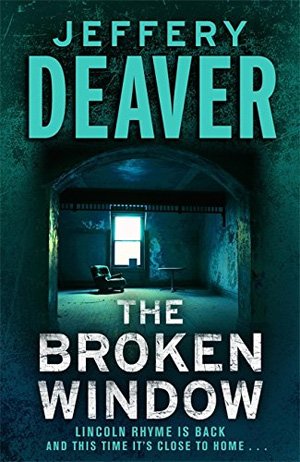 His own city of New York is not the default setting for the work of Jeffery Deaver, but it is central to such books as Broken Window. Alice is a successful Manhattan businesswoman, whose love life has been chequered of late. But at a wine tasting, she meets a man called Arthur who appears to be on her wavelength. Alison invites her new friend back to her apartment. She casually mentions a painting she’s bought which, to her surprise, he seems to know about already. With a cold shudder, she realises that there is a man in her bedroom she doesn’t really know. And then he puts on some beige cloth gloves and reaches into his pocket… One of the reasons why Jeffery Deaver is regarded as an ever-reliable crime writer is his skill with opening chapters (such as that described above), and after this chilling overture, The Broken Window puts us once again in the crotchety company of Deaver’s quadriplegic forensics consultant Lincoln Rhyme. Those who have enjoyed Rhyme’s intellectual battles with highly intelligent criminals before will know just how adroit Deaver is in this territory, despite the fact that his hero is confined to a wheelchair. His legs and eyes are, of course, his colleague Amelia Sachs, who invariably finds herself in extreme danger when acting on Rhyme’s hunches.
His own city of New York is not the default setting for the work of Jeffery Deaver, but it is central to such books as Broken Window. Alice is a successful Manhattan businesswoman, whose love life has been chequered of late. But at a wine tasting, she meets a man called Arthur who appears to be on her wavelength. Alison invites her new friend back to her apartment. She casually mentions a painting she’s bought which, to her surprise, he seems to know about already. With a cold shudder, she realises that there is a man in her bedroom she doesn’t really know. And then he puts on some beige cloth gloves and reaches into his pocket… One of the reasons why Jeffery Deaver is regarded as an ever-reliable crime writer is his skill with opening chapters (such as that described above), and after this chilling overture, The Broken Window puts us once again in the crotchety company of Deaver’s quadriplegic forensics consultant Lincoln Rhyme. Those who have enjoyed Rhyme’s intellectual battles with highly intelligent criminals before will know just how adroit Deaver is in this territory, despite the fact that his hero is confined to a wheelchair. His legs and eyes are, of course, his colleague Amelia Sachs, who invariably finds herself in extreme danger when acting on Rhyme’s hunches.
Buy now on Amazon
James Lee Burke – Louisiana
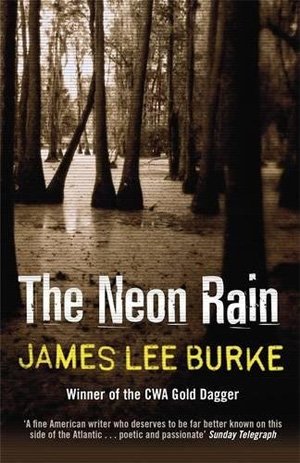 When it comes to literate, pungently characterised American crime writing, James Lee Burke has few peers. At the time his novels featuring Cajun detective Dave Robicheaux first appeared, the sultry Louisiana settings were something new in crime fiction, and the writing had a forceful yet poetic quality that differentiated it from anything else around. Dave Robicheaux, too, was something new: flawed, yes, and given to some moralising observations that at times sounded like the American religious right (surprising from an author who clearly regarded Reaganite USA as a very dark place to be), but Robicheaux is the most fully-rounded protagonist in modern American crime fiction. That’s not to say all is rosy in the Burke garden. Some of the recent novels have suggested the author lacked the fire of his best work, and a new series featuring lawyer Billy Bob Holland, while diverting enough, seemed more lightweight. Like many a crime writer, James Lee Burke originally saw himself as literary novelist – before he realised that he could address serious concerns (and finesse the quality of his writing) within the constraints of genre fiction. The first Dave Robicheaux novel, The Neon Rain (1987), instantly established the credentials of the series, both in terms of its uncompromising intensity and refusal to sit easily in any prescribed category. Robicheaux, attempting to come to terms with life back in the States after the horrors of Vietnam, has found solace in alcoholism, but has managed to claw his way back to sobriety. He has had a lengthy stint working for the New Orleans Police Department, and has made more enemies than friends within the force.
When it comes to literate, pungently characterised American crime writing, James Lee Burke has few peers. At the time his novels featuring Cajun detective Dave Robicheaux first appeared, the sultry Louisiana settings were something new in crime fiction, and the writing had a forceful yet poetic quality that differentiated it from anything else around. Dave Robicheaux, too, was something new: flawed, yes, and given to some moralising observations that at times sounded like the American religious right (surprising from an author who clearly regarded Reaganite USA as a very dark place to be), but Robicheaux is the most fully-rounded protagonist in modern American crime fiction. That’s not to say all is rosy in the Burke garden. Some of the recent novels have suggested the author lacked the fire of his best work, and a new series featuring lawyer Billy Bob Holland, while diverting enough, seemed more lightweight. Like many a crime writer, James Lee Burke originally saw himself as literary novelist – before he realised that he could address serious concerns (and finesse the quality of his writing) within the constraints of genre fiction. The first Dave Robicheaux novel, The Neon Rain (1987), instantly established the credentials of the series, both in terms of its uncompromising intensity and refusal to sit easily in any prescribed category. Robicheaux, attempting to come to terms with life back in the States after the horrors of Vietnam, has found solace in alcoholism, but has managed to claw his way back to sobriety. He has had a lengthy stint working for the New Orleans Police Department, and has made more enemies than friends within the force.
Buy now on Amazon
Dennis Lehane – Boston
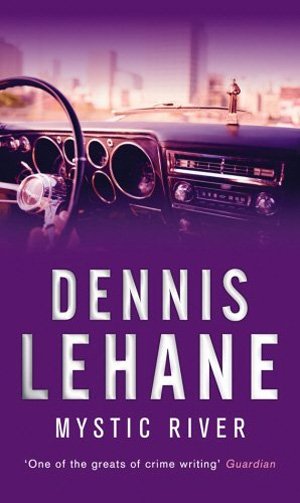 The Bostonian novels of Dennis Lehane have become must-reads on the strength of such gritty and forceful thrillers as Darkness, Take my Hand and Gone, Baby, Gone. Praised for his taut, carefully orchestrated storylines and expressively drawn, vulnerable characters, Lehane is the kind of writer who has achieved his position by stealth rather than massive advertising campaigns. Mystic River confirmed his status as one of the most vigorous and skilful American talents in years. Childhood friends, Sean, Jimmy and Dave have their lives changed when a strange car turns up in their street. After one boy gets into the car and two not, a terrible event happens which terminates their friendship and changes their lives. Twenty-five years later, Sean is a homicide detective, while Jimmy has taken a criminal route. When Jimmy’s daughter is found savagely killed, Sean is assigned to the case. And with his own personal relationships in deep trouble, he finds he is obliged to go back to the life he thought he had left behind, coming to terms with his ex-friends and a confrontation with a human monster. Lehane’s The Given Day weighed in at over 700 pages, but its successor, Live By Night – while leaner and more focused – still has a daunting reach, with a background of the Prohibition era (and the vicious gangsters who flourished then). The timespan of the novel is a decade, beginning in 1920s Boston and moving to Tampa and Cuba as we follow the tribulations of Joe Coughlin. Despite his respectable antecedents (son of a Boston captain of police), Joe has embraced a criminal lifestyle, employed by one of Boston’s most ruthless bootleggers.
The Bostonian novels of Dennis Lehane have become must-reads on the strength of such gritty and forceful thrillers as Darkness, Take my Hand and Gone, Baby, Gone. Praised for his taut, carefully orchestrated storylines and expressively drawn, vulnerable characters, Lehane is the kind of writer who has achieved his position by stealth rather than massive advertising campaigns. Mystic River confirmed his status as one of the most vigorous and skilful American talents in years. Childhood friends, Sean, Jimmy and Dave have their lives changed when a strange car turns up in their street. After one boy gets into the car and two not, a terrible event happens which terminates their friendship and changes their lives. Twenty-five years later, Sean is a homicide detective, while Jimmy has taken a criminal route. When Jimmy’s daughter is found savagely killed, Sean is assigned to the case. And with his own personal relationships in deep trouble, he finds he is obliged to go back to the life he thought he had left behind, coming to terms with his ex-friends and a confrontation with a human monster. Lehane’s The Given Day weighed in at over 700 pages, but its successor, Live By Night – while leaner and more focused – still has a daunting reach, with a background of the Prohibition era (and the vicious gangsters who flourished then). The timespan of the novel is a decade, beginning in 1920s Boston and moving to Tampa and Cuba as we follow the tribulations of Joe Coughlin. Despite his respectable antecedents (son of a Boston captain of police), Joe has embraced a criminal lifestyle, employed by one of Boston’s most ruthless bootleggers.
Buy now on Amazon
Sara Paretsky – Chicago
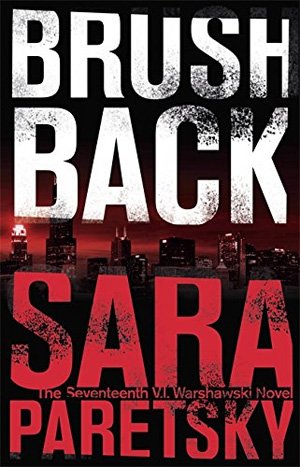 A chronicler of the city of Chicago to match Nelson Algren, Sara Paretsky is also the creator of VI Warshawski, who remains the most distinctive female private investigator in American crime fiction. The detective’s continuing survival – after numerous pummellings, both physical and emotional – is somehow both plausible and (for readers) very welcome. Cover-ups and conspiracies are familiar Warshawski territory, along with keen, fiery social commitment. Destructive family secrets often crop up; families can be threatening places in VI’s minatory world, repeatedly echoing Philip Larkin’s view of what our mothers and fathers do to us. And often, in Paretsky’s hefty books, the emotional involvement of her detective in the cases is both ill-advised and inevitable. There is also a keen sense of loss: the slow, melancholy demise of the American dream and the optimistic ideals of Paretsky’s baby boomer generation – which is not to say that the books aren’t always exhilarating and utterly involving.
A chronicler of the city of Chicago to match Nelson Algren, Sara Paretsky is also the creator of VI Warshawski, who remains the most distinctive female private investigator in American crime fiction. The detective’s continuing survival – after numerous pummellings, both physical and emotional – is somehow both plausible and (for readers) very welcome. Cover-ups and conspiracies are familiar Warshawski territory, along with keen, fiery social commitment. Destructive family secrets often crop up; families can be threatening places in VI’s minatory world, repeatedly echoing Philip Larkin’s view of what our mothers and fathers do to us. And often, in Paretsky’s hefty books, the emotional involvement of her detective in the cases is both ill-advised and inevitable. There is also a keen sense of loss: the slow, melancholy demise of the American dream and the optimistic ideals of Paretsky’s baby boomer generation – which is not to say that the books aren’t always exhilarating and utterly involving.
Take, for instance, Brush Back, the 18th Warshawski novel, set in her familiar territory of South Chicago, with Vic revisiting an old neighbourhood and a boyfriend she left behind years ago. Her old flame, Frank Guzzo, enlists her reluctant aid in a difficult problem. And obliged to clear a relative’s name, Warshawski finds herself – as so often before – in the fraught territory of political corruption and equally vicious neighbourhood resentments.
Much-acclaimed for her non-pareil detective fiction, Paretsky is also famous for her views on serious issues: the rise of religious fundamentalism in her own country, the Iraq War, the erosion of women’s rights, infringements on personal liberties.
Buy now on Amazon
Michael Connelly – Los Angeles
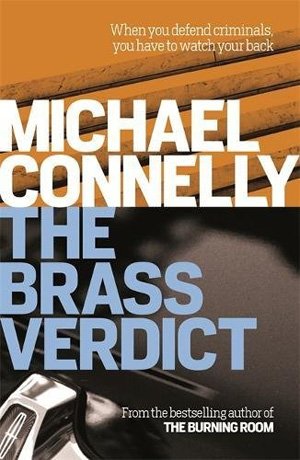 The range of LA authors stretches back to Chandler and beyond, but Michael Connelly is a key modern exemplar. The sales of his The Lincoln Lawyer shot through the roof after a UK TV book club selection. Existing Connelly fans (people of taste!), though, felt a tad superior to readers who discovered Connelly via this book – they were already familiar with the author’s tough detective Harry Bosch who had appeared in a dynamic series of novels, though not in The Lincoln Lawyer. That book showcased low-rent lawyer Mickey Haller, and he returned in an equally accomplished sequel. But Connelly had something else up his sleeve this time – added value for the reader when he sprang a surprise on us. In The Brass Verdict, Mickey is smarting after the rigours of his previous case. Then fellow lawyer Jerry Vincent is murdered, and Mickey finds himself the recipient of a highly unusual bequest: he has inherited all his dead colleague’s clients. And when the taciturn detective on the case suggests that the murdered lawyer was killed by one of his own clients, Mickey realises that his inheritance of this client list could be just as deadly to him as it was to Jerry Vincent. All of this is handled with the storytelling panache that has made Connelly such a reader favourite, but he’s not taking any chances that we might think this second outing for Mickey Haller is less engrossing than The Lincoln Lawyer – so who is the hard-nosed detective on the case, obliged to work with Mickey? None other than Harry Bosch, protagonist of earlier Connelly classics. Solo Bosch? Well, Echo Park is a solid outing, with the realisation of Harry’s troubled character handled with skill, banishing thoughts of cliché. This is Connelly doing what he does best: delivering a beautifully structured, richly atmospheric crime novel.
The range of LA authors stretches back to Chandler and beyond, but Michael Connelly is a key modern exemplar. The sales of his The Lincoln Lawyer shot through the roof after a UK TV book club selection. Existing Connelly fans (people of taste!), though, felt a tad superior to readers who discovered Connelly via this book – they were already familiar with the author’s tough detective Harry Bosch who had appeared in a dynamic series of novels, though not in The Lincoln Lawyer. That book showcased low-rent lawyer Mickey Haller, and he returned in an equally accomplished sequel. But Connelly had something else up his sleeve this time – added value for the reader when he sprang a surprise on us. In The Brass Verdict, Mickey is smarting after the rigours of his previous case. Then fellow lawyer Jerry Vincent is murdered, and Mickey finds himself the recipient of a highly unusual bequest: he has inherited all his dead colleague’s clients. And when the taciturn detective on the case suggests that the murdered lawyer was killed by one of his own clients, Mickey realises that his inheritance of this client list could be just as deadly to him as it was to Jerry Vincent. All of this is handled with the storytelling panache that has made Connelly such a reader favourite, but he’s not taking any chances that we might think this second outing for Mickey Haller is less engrossing than The Lincoln Lawyer – so who is the hard-nosed detective on the case, obliged to work with Mickey? None other than Harry Bosch, protagonist of earlier Connelly classics. Solo Bosch? Well, Echo Park is a solid outing, with the realisation of Harry’s troubled character handled with skill, banishing thoughts of cliché. This is Connelly doing what he does best: delivering a beautifully structured, richly atmospheric crime novel.
Buy now on Amazon
Daniel Woodrell – Missouri
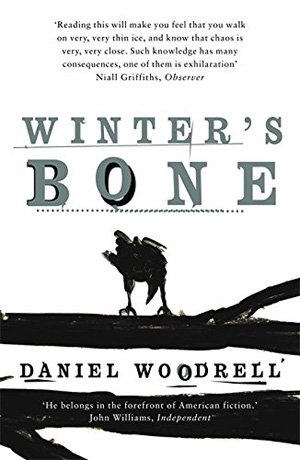 A definite sense of place is what distinguishes the work of cult writer Daniel Woodrell. His distinctive novels and short stories are mostly set in the Ozark Mountains in Missouri, and the author himself wryly described his work as ‘Country noir’, referring specifically to his novel Give Us a Kiss (1996, little known in the UK), but the phase has stuck as a generic term for Woodrell’s books. Those who have read his work – and that’s an ever-growing number of admirers beyond the hard-core group of aficionados – will know that Woodrell absolutely defies categorisation. That’s very much the case with the atmospheric and uncompromising Winter’s Bone, unquestionably his calling card book. The novel was very successfully filmed by Debra Granik with Jennifer Lawrence, and helped add lustre to the writer’s reputation. This tale of love and endurance in an unforgiving, blue collar American Mid-West is memorable indeed in the rigorous mien of its story telling. It’s also bleak, with the heroine, Ree, being forced to look after her sedated mother. But she soon has more pressing (and violent) problems. Powerful and unusual, with a strongly etched sense of its frigid locale. Woodrell certainly deserves to move out of the ‘niche’ corner.
A definite sense of place is what distinguishes the work of cult writer Daniel Woodrell. His distinctive novels and short stories are mostly set in the Ozark Mountains in Missouri, and the author himself wryly described his work as ‘Country noir’, referring specifically to his novel Give Us a Kiss (1996, little known in the UK), but the phase has stuck as a generic term for Woodrell’s books. Those who have read his work – and that’s an ever-growing number of admirers beyond the hard-core group of aficionados – will know that Woodrell absolutely defies categorisation. That’s very much the case with the atmospheric and uncompromising Winter’s Bone, unquestionably his calling card book. The novel was very successfully filmed by Debra Granik with Jennifer Lawrence, and helped add lustre to the writer’s reputation. This tale of love and endurance in an unforgiving, blue collar American Mid-West is memorable indeed in the rigorous mien of its story telling. It’s also bleak, with the heroine, Ree, being forced to look after her sedated mother. But she soon has more pressing (and violent) problems. Powerful and unusual, with a strongly etched sense of its frigid locale. Woodrell certainly deserves to move out of the ‘niche’ corner.
Buy now on Amazon
Carl Hiaasen – Florida
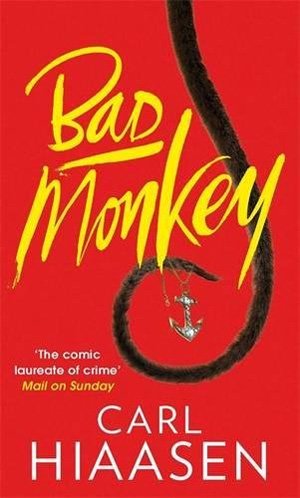 There is one writer who can always be guaranteed to make our jaws drop with his prodigality of invention: Carl Hiaasen. As in, for example, Bad Monkey, a typical Hiaasen Catherine wheel, showering out sprays of comically outlandish plotting and effects. Over the top? Perhaps, but Hiaasen’s Florida is a place where strange things happen.
There is one writer who can always be guaranteed to make our jaws drop with his prodigality of invention: Carl Hiaasen. As in, for example, Bad Monkey, a typical Hiaasen Catherine wheel, showering out sprays of comically outlandish plotting and effects. Over the top? Perhaps, but Hiaasen’s Florida is a place where strange things happen.
Miami policeman-turned-restaurant inspector Andrew Yancey’s career is on a downward spiral, not helped by his assaults on the husband of his girlfriend. He sees, however, a chance of redemption in the unlikely form of a severed human arm, chewed off by a shark. He attempts to reconnect it (metaphorically speaking) to the body to which it once belonged, and undertakes a memorably grotesque odyssey which has all the accoutrements of a rundown amusement park. Yancey is to run into and raucously intersect with a truly bizarre cast of characters, notably the owner of the severed arm, an ex-inamorata of his own who won’t let go, a coroner with unusual sexual tastes and a toothless Bahamian voodoo priestess. (Not to mention the bloody-minded simian of the title.) Other writers may attempt to emulate Hiaasen’s crowded plots, but it’s not just the latter that need to be replicated but the very individual, sardonic tone of voice which at times is suggestive of an American version of the late Tom Sharpe… with added mayhem. As one of the most inventive and entertaining of modern crime writers, Hiaasen’s influence on the genre has been so all-encompassing that his punchy, brittle-edged prose and sardonic humour may be found reproduced in the work of a hundred imitators.
Buy now on Amazon
George Pelecanos – Washington
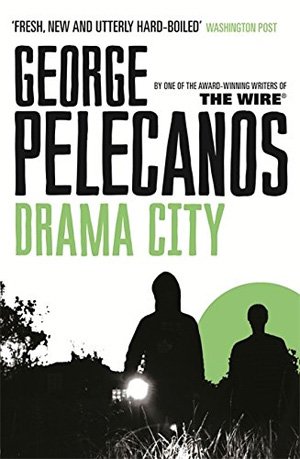 Washingtonian George Pelecanos shares black writer Walter Mosley’s cold-eyed view of American society’s treatment of race, though both men have a certain sympathy for those white men prepared to behave honourably in the face of the prejudice and incomprehension of their fellows. In this regard, while both share a left-of-centre view of society, they are not a million miles away from the social amelioration of Charles Dickens: it’s not so much a change in the very nature of society that is required, but simply that men should behave well.
Washingtonian George Pelecanos shares black writer Walter Mosley’s cold-eyed view of American society’s treatment of race, though both men have a certain sympathy for those white men prepared to behave honourably in the face of the prejudice and incomprehension of their fellows. In this regard, while both share a left-of-centre view of society, they are not a million miles away from the social amelioration of Charles Dickens: it’s not so much a change in the very nature of society that is required, but simply that men should behave well.
One of the reasons for George Pelecanos’ reputation is his on-the-nail evocation of modern idioms: the gritty, pungent America he paints makes most of his contemporaries seem pale. And there’s the soundtrack of his books: the carefully referenced popular music cues that his characters move to is a unique touch. Drama City is one of the author’s best books. Lorenzo Brown has left his criminal background behind, and is scratching a living in Washington as a dog warden. His parole officer, Rachel Lopez, finds that Lorenzo, despite his good intentions, is turning out to be her biggest problem. Like Mosley, Pelecanos has limited hope for either social justice or a rapprochement between the races, but both writers have produced books that crackle with a visceral energy
The bizarre juxtaposition of privilege and decay that is the city of Washington DC has rarely been anatomised as acutely as in his work. Many writers excel at the well-turned acerbic thriller, but few are able to combine the tough dialogue and bloodletting with a massively ambitious picture of a whole society – and that’s what Pelecanos achieves, time and time again.
Buy now on Amazon
Thomas H Cook – New England
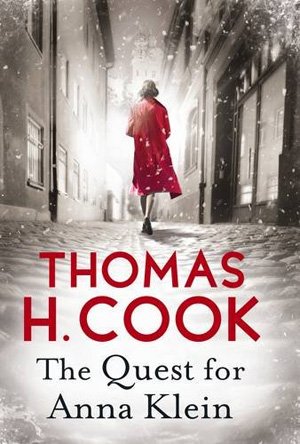 While setting some of his books in America’s Deep South, Thomas H Cook is strikingly good at conjuring the milieus of small towns in New England. But this is only one of his skills. Cook is one of those writers cherished by the cognoscenti, but whose name for many readers will suggest a travel company (hence, no doubt, the redundant ‘H’). The Quest for Anna Klein raised his profile – though, one might argue, insufficiently, given his achievement. Why is it that as readers we are almost always intrigued by a novel which takes the form of a quest? Is it because literary quests usually have a satisfying resolution, unlike those in real life? One of the most compelling quests in some considerable time is launched in Cook’s completely seductive novel. The search begins with Thomas Danforth, when a friend from the government comes to him with a highly unusual request. Danforth is to facilitate the training of an enigmatic young woman at his large estate in Connecticut. The woman, the seductive Anna Klein, is to throw Danforth’s carefully ordered existence into chaos. There are several things that make Cook’s novel so winning, not least the fact that the narrative is described retrospectively after the Al Qaeda destruction of the World Trade Center, with an older Danforth telling the story to Secret Service man Paul Crane. Cutting between the two time periods (Anna Klein’s story in 1939 and the terrorist atrocities of 2001), the quest that Danforth and Crane are involved in is for the truth behind Anna Klein’s story. Danforth had fallen in love with her – obsessively – before her disappearance. And the uncovering of the truth here is as shocking as anything in Cook’s inventive, steadily-paced novel.
While setting some of his books in America’s Deep South, Thomas H Cook is strikingly good at conjuring the milieus of small towns in New England. But this is only one of his skills. Cook is one of those writers cherished by the cognoscenti, but whose name for many readers will suggest a travel company (hence, no doubt, the redundant ‘H’). The Quest for Anna Klein raised his profile – though, one might argue, insufficiently, given his achievement. Why is it that as readers we are almost always intrigued by a novel which takes the form of a quest? Is it because literary quests usually have a satisfying resolution, unlike those in real life? One of the most compelling quests in some considerable time is launched in Cook’s completely seductive novel. The search begins with Thomas Danforth, when a friend from the government comes to him with a highly unusual request. Danforth is to facilitate the training of an enigmatic young woman at his large estate in Connecticut. The woman, the seductive Anna Klein, is to throw Danforth’s carefully ordered existence into chaos. There are several things that make Cook’s novel so winning, not least the fact that the narrative is described retrospectively after the Al Qaeda destruction of the World Trade Center, with an older Danforth telling the story to Secret Service man Paul Crane. Cutting between the two time periods (Anna Klein’s story in 1939 and the terrorist atrocities of 2001), the quest that Danforth and Crane are involved in is for the truth behind Anna Klein’s story. Danforth had fallen in love with her – obsessively – before her disappearance. And the uncovering of the truth here is as shocking as anything in Cook’s inventive, steadily-paced novel.
Buy now on Amazon
Purchase Barry Forshaw’s American Noir for the full story, using the button below.








